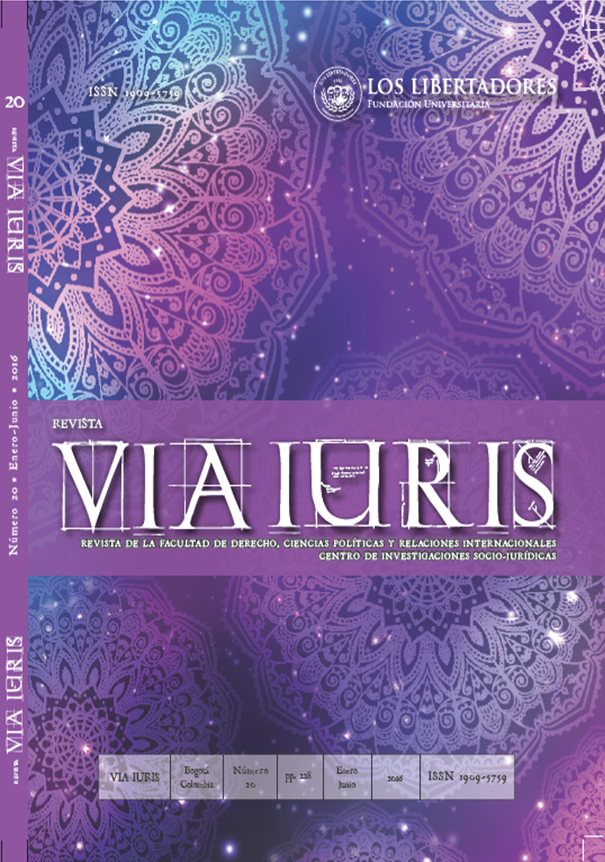Abstract
In concordance with studied academic and legal precedents, this work is backed up from a triple perspective: the permanent necessity for trengthening the essential cores of fundamental rights, the linguistic imprecisions with which concepts like typologies of rights and effective legal protection order have been handled, and, finally, the need for reformulating such incorrect treatment.
By means of a hermeneutic and deductive methodology, the authors have pondered in the matter, aiming to verify the results and assess them in the light of the fundamental principles of law. this will allow us to propose a solution for the proposed problem: is the understanding of the typologies of fundamental rights affecting the effective legal protection order? Regarding the results, it is evidenced that rights can have diverse contents and forms, insofar as guaranteeing integrity, freedom, or equality. These forms are protected by different national and international actions. However, not all the mechanisms in order to guarantee these rights possess the same legal force.
The existence of an effective legal protection order for all kind of rights is not fully reflected in reality. Therefore, the authors believe in the necessity of establishing mechanisms to equally protect all rights. As a general conclusion, it can be said that the effective legal protection order is not obeyed in those systems that only establish penalties for the affectation of integrity rights, being detrimental to equality and freedom.
References
Araújo, R. (2011). Acceso a la justicia efectiva. Pro-puesta para fortalecer la justicia administrativa. Visión de derecho comparado. Revista Estudios Socio-Jurídicos, 13(1), 254.
Bernal, B., Ledesma, J. (1981). Historia del Derecho Romano y de los derechos neoromanistas. Tomo I. De los orígenes a la alta edad media. México: Universidad Nacional Autónoma de México. Instituto de Investigaciones Jurídicas
Bernal, C. (2005). El derecho de los derechos. Bogotá: Universidad Externado de Colombia.
Blanco, G. (2003).La acción de cumplimiento: comentarios a las limitaciones de su ejercicio. Revista de derecho, 19, 142-160.
Borges, J. (1976). El idioma analítico de John Wilkins, otras inquisiciones. Madrid: Alianza.
Cepeda, M. (1993). Introducción a la Constitución de 1991, presidencia de la República. Bogotá: Imprenta Nacional de Colombia.
García de Enterría, E. (1983). La lucha contra las inmunidades del poder en el derecho administrativo. Madrid: Civitas Ediciones.
Fiorivanti, M. (2001). Constitución. De la antigüedad a nuestros días. Madrid: Trotta.
Higuera, D. (2012). Bloque de constitucionalidad en Colombia: jurisprudencia y doctrina. Madrid: Editorial Académica Española.
Higuera, D. (2015). Le contrôle de constitutionnalité en France et en Colombie. Francia: Editions Universitaires Europeennes.
Higuera, D. (2015) Protección de la dignidad humana: control de constitucionalidad e implementación de mecanismos internacionales. Bogotá: Ediciones Jurídicas Gustavo Ibáñez.
López, D. (2002). Manual de interpretación constitucional. Bogotá: Consejo Superior de la Judicatura - Escuela Judicial Rodrigo Lara Bonilla.
Kymlicka, W. (2009). Las odiseas multiculturales. Madrid: Paidós.
Naranjo, V. (2010). Teoría constitucional e instituciones políticas. Bogotá: Temis.
Quinche, M. (2008). Derecho constitucional. Bogotá: Ibáñez.
Uprimny, R. (1992). La dialéctica de los derechos humanos en Colombia. Bogotá: Fundación Universitaria Autónoma de Colombia
Uprimny, R. (2003). Legitimidad y conveniencia del control constitucional a la economía. En In-dependencia Judicial en América Latina¿de quién?, ¿para qué? ¿cómo? Bogotá: Instituto de Servicios Legales Alternativos-ILSA.
Uprimny, R. (2006). Hay que mantener la tutela contra sentencias. Recuperado el 5 de mayo de 2006 de http://dejusticia.org/interna.php?id_tipo_publicacion=7&id_publicacion=72. Centro de Estudios de Derecho Justicia y Sociedad-De Justicia
Urbano, J. (2013) El control de la acusación. Una re-flexión sobre los límites del poder de acusar en el Estado constitucional de derecho. Bogotá: Universidad Externado de Colombia.
Younes, D. (2006). Derecho constitucional. Bogotá: Editorial Ibáñez.
SENTENCIAS
Código de Procedimiento Civil. Decretos números 1400 y 2019 de 1970. Artículo 4. Agosto 6 y octubre 26 de 1970 (Colombia).
Consejo de Estado. Sentencia AP-052 de 2002. (M.P. Jesús María Carrillo Ballesteros; 24 de Agosto de 2002).
Corte Interamericana de Derechos Humanos. Garantías judiciales en estados de emergencia (Arts. 27.2, 25 y 8 Convención Americana sobre Derechos Humanos), Opinión Consultiva OC-9/87 del 6 de octubre de 1987, Serie A No. 9, párr. 24.).
Corte Constitucional de Colombia. Sentencia C-416. (M.P. Antonio Barrera Carbonell; 22 de septiembre de 1994).
Corte Constitucional. Sentencia T-268 de 1996. (M. P. Antonio Barrera Carbonell; 18 de junio de 1996).
Corte Constitucional. Sentencia C-157 de 1998. (M.P. Antonio Barrera Carbonell & Hernando Herrera Vergara; 29 de abril de 1998).
Corte Constitucional. Sentencia C-158/1998. (M.P. Vladimiro Naranjo Mesa; 29 de abril de 1998).
Corte Constitucional. Sentencia C-037 de 2000. (M.P. Vladimiro Naranjo Mesa; 26 de enero de 2000).
Corte Constitucional. Sentencia C-1195 de 2001. (M.P. Manuel José Cepeda & Marco Gerardo Monroy Cabra; 15 de noviembre de 2001).
Corte Constitucional. Sentencia C-426 de 2002. (M.P. Rodrigo Escobar Gil; 29 de mayo de 2002).
Corte Constitucional. Sentencia C- 622 del 14 de Agosto de 2007. (M.P. Rodrigo Escobar Gil; 14 de agosto de 2007).
Corte Constitucional. Sentencia C-279 de 2013. (M.S. Jorge Ignacio Pretelt Chaljub; 15 de mayo de 2013).
Ley 1564 de 2012. Por medio de la cual se expide el Código General del Proceso y se dictan otras disposiciones. 12 de julio de 2012. D.O. No. 48.489.

This work is licensed under a Licencia Creative Commons Atribución-NoComercial-

